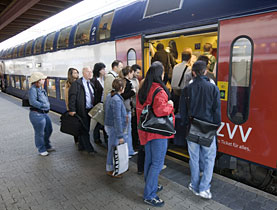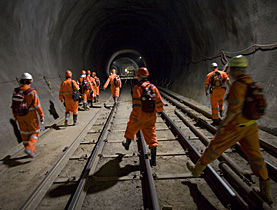Swiss on track for a world record

When it comes to notching up train miles, no one beats the Swiss. And only the Japanese make more train trips.
“Those with brains take trains” (Der Kluge reist im Zuge): the Swiss Federal Railways’ motto certainly applies in Switzerland.
The Swiss are avid train travellers – and users of public transport in general.
Every year the International Union of Railways (UIC) publishes its statistics, and according to the latest figures, which refer to 2007, every Swiss undertook 47 train journeys.
This is a European record – the second-placed Luxembourgers managed a mere 35 trips. The wooden spoon went to the Greeks, who on average make only one train trip a year – how they get home wasn’t explained…
While the Japanese take more trips (70 per head per year), they don’t travel as far as the Swiss.
The UIC calculated that each Swiss travelled 2,103km over the year, compared with 1,976km for the Japanese.
Simple, comfy and cheap
This impressive performance is down to Switzerland’s synchronised timetable, good connections when changing trains, reliability, punctuality, motivated staff, modern trains and clear pricing system, according to the Swiss public transport information service.
In short, travelling by train in Switzerland is simple, comfortable and (as long as you have some sort of annual subscription) cheap.
A half price card, for example, costs SFr150 ($140) for one year and enables you to travel the entire Swiss public transport network, which covers a total of 24,500km, at half price.
The GA (General Abonnement) is a one-off payment that covers the entire network for one year – although at SFr4,850 first class and SFr3,100 second class this is not for occasional day trippers.
Under pressure
The Swiss Federal Railways are understandably proud of their top international ranking.
Spokesman Reto Kormann told swissinfo.ch that representatives from foreign transport firms regularly visit in order to gain an insight into Swiss railway efficiency.
Ironically this success is also becoming a burden: capacity is at its limit and, especially at rush hour, trains can no longer offer the customary service and comfort.
Many commuters on the one-hour trip between Zurich and Bern no longer get a seat, although the carriages are double-deckers.
“The trains are slowly becoming victims of their own success,” admits Kurt Schreiber, vice-president of Pro Bahn Switzerland, a public transport lobby group.
Schreiber is calling for an expansion of infrastructure and greater track capacity, otherwise passengers will start turning away.
“If I no longer get a seat, I’d certainly consider taking the car and listening to Mozart, even if that means the odd traffic jam,” he said.
Targeted measures
The Federal Railways are aware of this danger. The “Bahn 2030” project should improve the infrastructure and sort out bottlenecks, such as the one between Zurich and Winterthur.
A third track between Geneva and Lausanne is also essential, but parliament has yet to discuss the funding.
In the meantime the Federal Railways are implementing targeted measures, “squeezing the squeezed lemon a little bit more,” as Kormann put it.
In particular, passengers are being encouraged to travel during the day, when trains are less congested.
Around 9,000 trains travel the Swiss Federal Railways network every day. 1,000 trains arrive at and depart from major stations daily and heavily used track sections count 500 trains a day.
Federal Railways says that its network has the highest density of traffic in Europe. Nevertheless, it says that 19 out of 20 passenger trains arrive at their destinations within four minutes of the scheduled time.
The company reported a nearly 27 per cent rise in profits for the first half of 2009 to SFr132.8 million ($131 million). Operating expenses fell by SFr201.2 million, it said in September.
(translated from German by Thomas Stephens)

In compliance with the JTI standards
More: SWI swissinfo.ch certified by the Journalism Trust Initiative













You can find an overview of ongoing debates with our journalists here . Please join us!
If you want to start a conversation about a topic raised in this article or want to report factual errors, email us at english@swissinfo.ch.